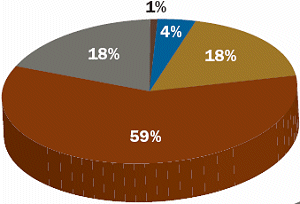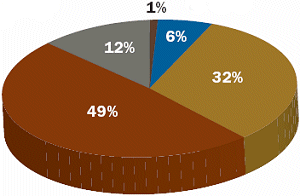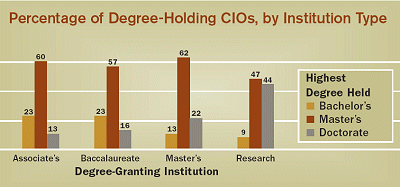A Degree of Difference
If you want climb the CIO ladder, you may need that advanced diploma.
While it may not be an official job requirement at many institutions, the majority of higher ed CIOs have advanced degrees,
according to a new Center for Higher Education Chief Information Officer Studies (CHECS) survey of 352 higher ed CIOs.
CHECS also surveyed campus technology leaders (the level below CIO) on the same topic. Here's how the data break out:
Overall Enrollment Leaps...
Over three quarters (77 percent) of CIO
survey respondents reported having either
a master's (59 percent) or doctoral (18
percent) degree. At the same time, the
CHECS survey of 222 technology leaders
(TL) found that less than two-thirds of
these respondents (61 percent) reported
having an advanced degree.
Wayne Brown, founder of CHECS, surmises that
fewer technology leaders may have an advanced degree
because "TLs are typically focused on the day-to-day
operations and are a lot closer to the technology than
the CIO. They are working on their certifications."

Highest Degrees
Held by CIOs

Highest Degrees
Held by Technology
Leaders

 The study further notes that the
type of institution where the CIO
works may be a strong determiner
of what kind of degree he or she
has: For example, only 9 percent of
CIOs at research universities
reported bachelor's degrees as
their highest-attained degree,
compared to 13 percent of CIOs at
master's-granting institutions, 23
percent at baccalaureate-only
institutions, and 23 percent at two-year
or associate's-degree colleges.
"Clearly, an advanced degree is important for an aspiring higher education CIO," posits Brown, who himself is a CIO
at Excelsior College in Albany, NY, and holds both a PhD and an MBA. While an advanced degree may not show up on
a job posting as a formal requirement-- a recent unscientific look at CIO-type jobs on higheredjobs.com revealed that
only one out of the 11 jobs posted asked for an advanced degree-- "There is clearly a significant majority of higher
education CIOs who have one," Brown says. "And if you are competing with those same people for a job-- especially at
a master's- or research-level institution-- your degree will be one of the considerations."
The study further notes that the
type of institution where the CIO
works may be a strong determiner
of what kind of degree he or she
has: For example, only 9 percent of
CIOs at research universities
reported bachelor's degrees as
their highest-attained degree,
compared to 13 percent of CIOs at
master's-granting institutions, 23
percent at baccalaureate-only
institutions, and 23 percent at two-year
or associate's-degree colleges.
"Clearly, an advanced degree is important for an aspiring higher education CIO," posits Brown, who himself is a CIO
at Excelsior College in Albany, NY, and holds both a PhD and an MBA. While an advanced degree may not show up on
a job posting as a formal requirement-- a recent unscientific look at CIO-type jobs on higheredjobs.com revealed that
only one out of the 11 jobs posted asked for an advanced degree-- "There is clearly a significant majority of higher
education CIOs who have one," Brown says. "And if you are competing with those same people for a job-- especially at
a master's- or research-level institution-- your degree will be one of the considerations."

of higher ed technology leaders are
working on their next degree.
Some campus tech leaders are already on the road to an advanced diploma. Brown
reports that when TLs were asked what they were doing to get ready for the CIO role,
24 percent of them said they were working on their next degree.
The full version of the CIO and technology leader reports can be found at the CHECS
website.